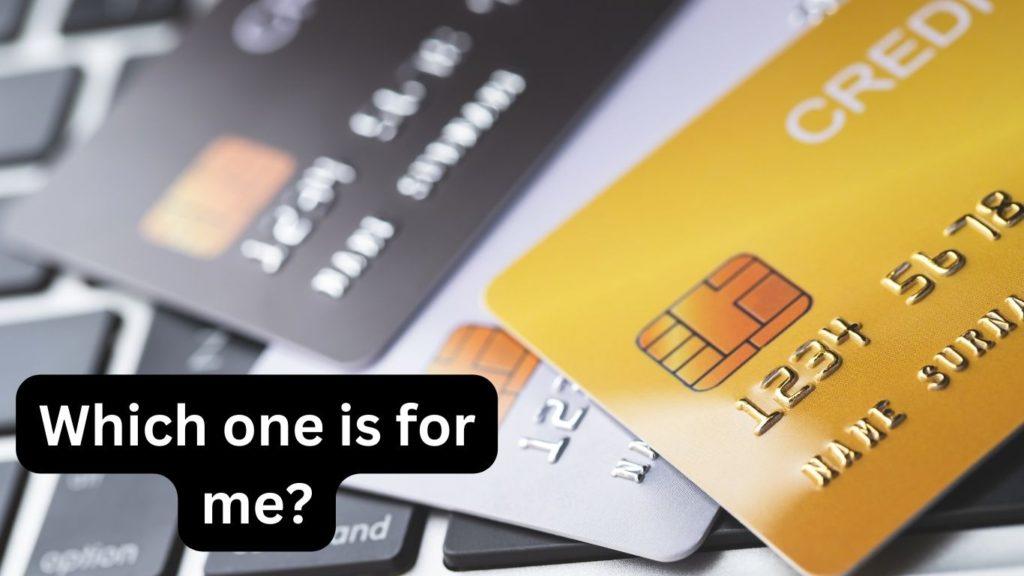How many types of credit cards are there?
I am sure you have received plenty of mail with credit card offers, and each offer has something different to catch your attention. How do you know what credit cards work for you? How do you know if the offer that was mailed to you will actually fulfill your needs? There are so many different sources out there talking about the types of credit cards and they all have a different answer. So, how many types of credit cards are there?
I have a few credit cards each from a different credit card provider and each has a different purpose. Here you will get a big picture of the different types of credit card and how to know which one is good for you.
Why do we use credit cards?

We use credit cards to make purchases instead of using cash or debit cards. Generally, credit cards are easy to use and carry around, provide financial protection, and fraud purchases can easily be disputed and removed.
But… That is not it!
Credit cards can be a great way to navigate your way out of financial issues like debt. I used a credit card when I was in college to help me with my tuition payments. I am now student debt free!! Watch my video on YouTube on how I did it.
Do you actually need a credit card?
Well if you are not someone who has enough money for anything in cash, then I would say you need a credit card.
If you are planning on buying a house, getting a job, or doing anything that requires good credit, then you need a credit card. Credit cards can also provide funds for emergency situations like having to go to the hospital.
However, if you are someone who lacks self-control and has concerns about overspending then you might want to contact a financial advisor.
How many different types of credit cards?

The big picture for the types of credit cards out there is that there are 3 types of credit cards. Technically, there is not a definitive number of types of credit cards. But, all the credit card types fit in the following 3 general types/categories.
Let’s break it down, credit cards are mainly for purchasing and then being able to pay it back on time to build your credit score. Everyone would most likely start out with a plain old credit card. That is type #1, the standard credit card.
You start getting your credit going and you might see an increase in your credit limit if you have been paying everything on time. Now you can consider getting rewards for purchasing with your credit card. This is type #2, rewards credit card.
Everything is working out nicely, you have a great credit score and you are getting paid or rewarded for spending money. But, suddenly you lost your job and your credit card went through the roof.
Your credit score drops drastically, and meanwhile after a couple weeks you get another job. What do you do to mend your credit? Well… credit card type #3, specific need credit card.
The 3 types/categories of credit cards
Standard Credit Card
This is the straightforward credit card that isn’t complicated. If you are looking for a simple credit card without a headache or reward complexity, then this type of credit card is best for you.
Benefits to having a Standard credit card
Cost Savings
Some standard credit cards come with no annual fee or lower fees compared to premium credit cards. If you want to avoid annual fees or minimize costs associated with owning a credit card, a standard card can be a cost-effective choice.
Building Credit History
Standard credit cards can be beneficial for individuals who are starting to build their credit history. Since they typically have lower eligibility requirements compared to specialized cards, they may be more accessible to individuals with limited or no credit history.
Emergency Use
A standard credit card can serve as a backup for emergency situations when immediate cash is not available. It provides a line of credit that can be utilized for unexpected expenses or urgent needs.
Reward Credit Card
It is just crazy to me that I can earn money while spending someone else’s money as long as I pay it back on time. Checkout a video I have on how to use a credit card wisely to make money.
Examples of rewards that can be achieved by using a rewards credit card
Cashback
With a cashback Rewards Credit Card, you earn a percentage of the amount you spend on eligible purchases.
For example, if your card offers 1% cashback and you make a $100 purchase, you would earn $1 cashback. The exact percentage and eligible purchase categories can vary depending on the specific credit card and its rewards program.
Travel points
With a travel points Rewards Credit Card, you earn points for every eligible purchase you make using the card.
The number of points earned is typically based on a percentage of your spending. For example, you might earn 1 point for every dollar spent on eligible purchases.
The accumulated travel points can be redeemed for various travel-related expenses, such as flights, hotel stays, car rentals, cruises, or vacation packages.
Credit card issuers often have partnerships or travel booking portals where you can redeem your points for these travel rewards.
Discounts
Some Rewards Credit Cards have partnerships with specific merchants or retailers. As a cardholder, you may be eligible for discounts or special offers when making purchases at these partner establishments.
These discounts can range from a percentage off the total purchase price to specific promotions or exclusive deals.
Specific Need Credit Card
Like I mentioned in the example above about losing a job your credit score plunders, specific needs credit cards help with these situations.
So, depending on what it is you are trying to achieve with a credit card there might be a credit card exactly for that.
And for this situation above a person would probably consider this type of specific needs credit card.
Secured Credit Cards: Geared toward individuals with limited or no credit history, secured cards require a cash deposit as collateral. The credit limit is typically equal to the deposited amount, and responsible use can help build or rebuild credit.
Examples of specific need credit cards
Balance Transfer Credit Cards
These cards allow users to transfer balances from one credit card to another, typically at a lower interest rate or with an introductory 0% APR (Annual Percentage Rate) for a specific period. This helps consolidate debts and save on interest charges.
Business Credit Cards
Designed for business owners, these cards provide features tailored to business expenses, such as detailed expense tracking, higher credit limits, employee card management, and rewards on business-related spending.
Student Credit Cards
This is specifically for students with limited credit history, these cards offer lower credit limits and simplified terms. They can be a good starting point for building credit responsibly.
How do you know which credit card is best for you?
Identify Your Goals and Priorities
Start by defining your goals and priorities. Consider what you want to achieve with a credit card. Are you looking to build credit, earn rewards, get cashback, access travel benefits, or simply have a card for emergencies? Knowing your objectives will guide your decision-making process.
Understand Fees and Interest Rates
Pay attention to the fees associated with the credit card, such as annual fees, foreign transaction fees, or balance transfer fees.
Additionally, consider the interest rates charged on the card, especially if you plan to carry a balance. Select a credit card with favorable fees and competitive interest rates to minimize costs.
Consider Your Financial Discipline
Be honest with yourself about your financial discipline and ability to manage credit responsibly. If you tend to carry balances or struggle with overspending, prioritize finding a card with low interest rates and manageable credit limits to avoid falling into debt.
Read Reviews and Compare Offers
Research credit card options online, read reviews, and compare offers from multiple issuers.
Websites and financial institutions provide tools to compare credit cards side by side, allowing you to evaluate their features, rewards programs, fees, and customer reviews.
This information can help you make an informed decision.
Credit card match tool
Also, you can try this tool that will help you get a credit card match.
Before you go
Although there are many different types of credit cards, they can be sorted into 3 general types. Breaking down each type and taking a look at the details of each, you can an idea of what credit card would be a good match for you.
After exploring the different types of credit cards, and maybe finding a credit card that would be a great match for your situation. You would probably want to check out my post on the mistakes you want to avoid as a credit card holder.
So long…
